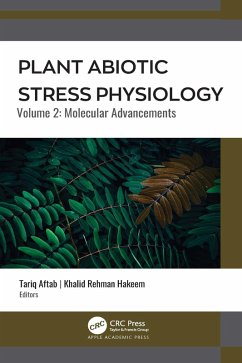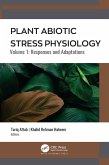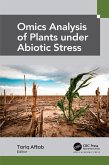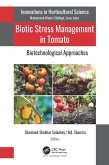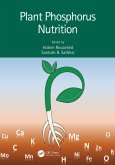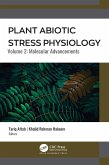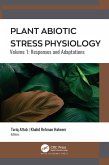Plant Abiotic Stress Physiology (eBook, ePUB)
Volume 2: Molecular Advancements
Redaktion: Aftab, Tariq; Hakeem, Khalid Rehman
134,95 €
134,95 €
inkl. MwSt.
Sofort per Download lieferbar

67 °P sammeln
134,95 €
Als Download kaufen

134,95 €
inkl. MwSt.
Sofort per Download lieferbar

67 °P sammeln
Jetzt verschenken
Alle Infos zum eBook verschenken
134,95 €
inkl. MwSt.
Sofort per Download lieferbar
Alle Infos zum eBook verschenken

67 °P sammeln
Plant Abiotic Stress Physiology (eBook, ePUB)
Volume 2: Molecular Advancements
Redaktion: Aftab, Tariq; Hakeem, Khalid Rehman
- Format: ePub
- Merkliste
- Auf die Merkliste
- Bewerten Bewerten
- Teilen
- Produkt teilen
- Produkterinnerung
- Produkterinnerung

Bitte loggen Sie sich zunächst in Ihr Kundenkonto ein oder registrieren Sie sich bei
bücher.de, um das eBook-Abo tolino select nutzen zu können.
Hier können Sie sich einloggen
Hier können Sie sich einloggen
Sie sind bereits eingeloggt. Klicken Sie auf 2. tolino select Abo, um fortzufahren.

Bitte loggen Sie sich zunächst in Ihr Kundenkonto ein oder registrieren Sie sich bei bücher.de, um das eBook-Abo tolino select nutzen zu können.
Discusses how plants have developed diverse physiological and molecular adjustments to safeguard themselves under challenging conditions and how emerging new technologies can utilize these plant adaptations to enhance plant resistance. These include genomics and phenomics approaches, methyl jasmonate and salicylic acid, harnessing the CRISPR/CAS sy
- Geräte: eReader
- ohne Kopierschutz
- eBook Hilfe
- Größe: 8.65MB
Andere Kunden interessierten sich auch für
![Plant Abiotic Stress Physiology (eBook, ePUB) Plant Abiotic Stress Physiology (eBook, ePUB)]() Plant Abiotic Stress Physiology (eBook, ePUB)134,95 €
Plant Abiotic Stress Physiology (eBook, ePUB)134,95 €![Omics Analysis of Plants under Abiotic Stress (eBook, ePUB) Omics Analysis of Plants under Abiotic Stress (eBook, ePUB)]() Omics Analysis of Plants under Abiotic Stress (eBook, ePUB)106,95 €
Omics Analysis of Plants under Abiotic Stress (eBook, ePUB)106,95 €![Advances in Plant Disease Management (eBook, ePUB) Advances in Plant Disease Management (eBook, ePUB)]() Advances in Plant Disease Management (eBook, ePUB)51,95 €
Advances in Plant Disease Management (eBook, ePUB)51,95 €![Biotic Stress Management in Tomato (eBook, ePUB) Biotic Stress Management in Tomato (eBook, ePUB)]() Biotic Stress Management in Tomato (eBook, ePUB)143,95 €
Biotic Stress Management in Tomato (eBook, ePUB)143,95 €![Plant Phosphorus Nutrition (eBook, ePUB) Plant Phosphorus Nutrition (eBook, ePUB)]() Plant Phosphorus Nutrition (eBook, ePUB)51,95 €
Plant Phosphorus Nutrition (eBook, ePUB)51,95 €![Plant Abiotic Stress Physiology (eBook, PDF) Plant Abiotic Stress Physiology (eBook, PDF)]() Plant Abiotic Stress Physiology (eBook, PDF)134,95 €
Plant Abiotic Stress Physiology (eBook, PDF)134,95 €![Plant Abiotic Stress Physiology (eBook, PDF) Plant Abiotic Stress Physiology (eBook, PDF)]() Plant Abiotic Stress Physiology (eBook, PDF)134,95 €
Plant Abiotic Stress Physiology (eBook, PDF)134,95 €-
-
-
Discusses how plants have developed diverse physiological and molecular adjustments to safeguard themselves under challenging conditions and how emerging new technologies can utilize these plant adaptations to enhance plant resistance. These include genomics and phenomics approaches, methyl jasmonate and salicylic acid, harnessing the CRISPR/CAS sy
Dieser Download kann aus rechtlichen Gründen nur mit Rechnungsadresse in A, B, BG, CY, CZ, D, DK, EW, E, FIN, F, GR, HR, H, IRL, I, LT, L, LR, M, NL, PL, P, R, S, SLO, SK ausgeliefert werden.
Produktdetails
- Produktdetails
- Verlag: Taylor & Francis
- Seitenzahl: 322
- Erscheinungstermin: 16. Februar 2022
- Englisch
- ISBN-13: 9781000401004
- Artikelnr.: 63141119
- Verlag: Taylor & Francis
- Seitenzahl: 322
- Erscheinungstermin: 16. Februar 2022
- Englisch
- ISBN-13: 9781000401004
- Artikelnr.: 63141119
- Herstellerkennzeichnung Die Herstellerinformationen sind derzeit nicht verfügbar.
Tariq Aftab, PhD, is currently an Assistant Professor in the Department of Botany at Aligarh Muslim University, India, where he earned his PhD. He is the recipient of a prestigious Leibniz-DAAD fellowship from Germany, a Raman Fellowship from the Government of India, and a Young Scientist Awards from the State Government of Uttar Pradesh (India) and Government of India. After completing his doctorate, he worked as Research Fellow at the National Bureau of Plant Genetic Resources, New Delhi, and as Postdoctorate Fellow at Jamia Hamdard, New Delhi, India. Dr. Aftab was also a Visiting Scientist at the Leibniz Institute of Plant Genetics and Crop Plant Research (IPK), Gatersleben, Germany, and in the Department of Plant Biology, Michigan State University, USA. He is a member of various scientific associations from India and abroad. He has edited seven books with with international publishers, including Elsevier Inc., Springer Nature and CRC Press (Taylor & Francis Group); co-authored several book chapters, and has published over 60 research papers in peer-reviewed international journals. His research interests include physiological, proteomic, and molecular studies on medicinal and aromatic plants. Khalid Rehman Hakeem, PhD, is Professor at King Abdulaziz University, Jeddah, Saudi Arabia. After completing his doctorate (botany; specialization in plant eco-physiology and molecular biology) from Jamia Hamdard, New Delhi, India, he worked as a lecturer at the University of Kashmir, Srinagar, India, at Universiti Putra Malaysia, Selangor, Malaysia, he was a Postdoctorate Fellow and Fellow Researcher (Associate Professor) for several years. Dr. Hakeem has more than 10 years of teaching and research experience in plant eco-physiology, biotechnology and molecular biology, medicinal plant research, plant-microbe-soil interactions, as well as in environmental studies. He is the recipient of several fellowships at both national and international levels. He has served as a visiting scientist at Jinan University, Guangzhou, China. Currently, he is involved with a number of international research projects with different government organizations. To date, Dr. Hakeem has authored and edited more than 60 books with international publishers. He also has to his credit more than 115 research publications in peer-reviewed international journals and 55 book chapters in edited volumes with international publishers. At present, Dr. Hakeem serves as an editorial board member and reviewer for several high-impact international scientific journals. He is included in the advisory board of Cambridge Scholars Publishing, UK. He is also a fellow of the Plantae group of the American Society of Plant Biologists, member of the World Academy of Sciences, member of the International Society for Development and Sustainability, Japan, and member of the Asian Federation of Biotechnology, Korea.
1. Plant-Environment Interaction in Developing Crop Species Resilient to
Climate Change 2. Genomics Approaches to Study Abiotic Stress Tolerance in
Plants 3. Role of Phenomics in Screening Abiotic Stress Tolerance in Plants
4. Genetic Regulation, Biosynthesis and the Roles of Osmoprotective
Compounds in Abiotic Stress Tolerance in Plants 5. Plant Growth Regulators
and Their Interaction with Abiotic Stress Factors 6. Role of Abscisic Acid
in Abiotic Stress Condition and Its Management 7. Management of Abiotic
Stress Conditions by Salicylic Acid 8. Ethylene Signaling During Leaf
Senescence 9. Role of Methyl Jasmonate in Mitigating Plant Stress and Its
Interaction with Salicylic Acid 10. Harnessing the CRISPR/CAS System for
Resistance Against Abiotic Stresses in Rice: Recent Advances, Applications,
Challenges, and Prospects 11. Emerging Roles of Osmoprotectants in the
Abiotic Stress Tolerance of Plants
Climate Change 2. Genomics Approaches to Study Abiotic Stress Tolerance in
Plants 3. Role of Phenomics in Screening Abiotic Stress Tolerance in Plants
4. Genetic Regulation, Biosynthesis and the Roles of Osmoprotective
Compounds in Abiotic Stress Tolerance in Plants 5. Plant Growth Regulators
and Their Interaction with Abiotic Stress Factors 6. Role of Abscisic Acid
in Abiotic Stress Condition and Its Management 7. Management of Abiotic
Stress Conditions by Salicylic Acid 8. Ethylene Signaling During Leaf
Senescence 9. Role of Methyl Jasmonate in Mitigating Plant Stress and Its
Interaction with Salicylic Acid 10. Harnessing the CRISPR/CAS System for
Resistance Against Abiotic Stresses in Rice: Recent Advances, Applications,
Challenges, and Prospects 11. Emerging Roles of Osmoprotectants in the
Abiotic Stress Tolerance of Plants
1. Plant-Environment Interaction in Developing Crop Species Resilient to
Climate Change 2. Genomics Approaches to Study Abiotic Stress Tolerance in
Plants 3. Role of Phenomics in Screening Abiotic Stress Tolerance in Plants
4. Genetic Regulation, Biosynthesis and the Roles of Osmoprotective
Compounds in Abiotic Stress Tolerance in Plants 5. Plant Growth Regulators
and Their Interaction with Abiotic Stress Factors 6. Role of Abscisic Acid
in Abiotic Stress Condition and Its Management 7. Management of Abiotic
Stress Conditions by Salicylic Acid 8. Ethylene Signaling During Leaf
Senescence 9. Role of Methyl Jasmonate in Mitigating Plant Stress and Its
Interaction with Salicylic Acid 10. Harnessing the CRISPR/CAS System for
Resistance Against Abiotic Stresses in Rice: Recent Advances, Applications,
Challenges, and Prospects 11. Emerging Roles of Osmoprotectants in the
Abiotic Stress Tolerance of Plants
Climate Change 2. Genomics Approaches to Study Abiotic Stress Tolerance in
Plants 3. Role of Phenomics in Screening Abiotic Stress Tolerance in Plants
4. Genetic Regulation, Biosynthesis and the Roles of Osmoprotective
Compounds in Abiotic Stress Tolerance in Plants 5. Plant Growth Regulators
and Their Interaction with Abiotic Stress Factors 6. Role of Abscisic Acid
in Abiotic Stress Condition and Its Management 7. Management of Abiotic
Stress Conditions by Salicylic Acid 8. Ethylene Signaling During Leaf
Senescence 9. Role of Methyl Jasmonate in Mitigating Plant Stress and Its
Interaction with Salicylic Acid 10. Harnessing the CRISPR/CAS System for
Resistance Against Abiotic Stresses in Rice: Recent Advances, Applications,
Challenges, and Prospects 11. Emerging Roles of Osmoprotectants in the
Abiotic Stress Tolerance of Plants
